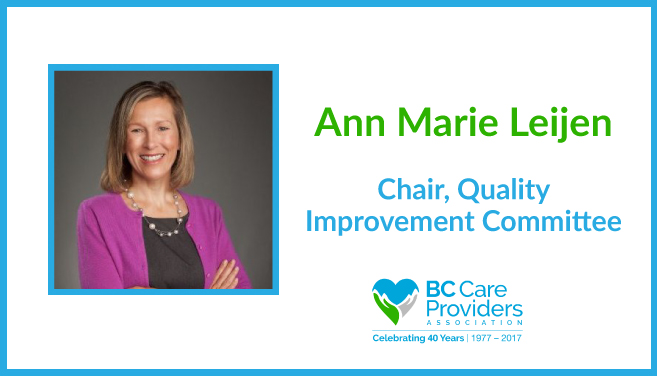Ann Marie Leijen knows through years of caregiving experience that quality of life is variable, subjective, and unsustainable without constant effort.
Chair of BCCPA’s Quality Improvement Committee, Leijen believes research-backed methods and a hands-on approach have helped her improve quality of life for residents at her care homes.
From reducing anti-psychotics use to adopting alternative therapies, Leijen’s success at Cheam Village—where she serves as executive director—is tangible and exemplary.
A candid chat reveals her honest and unique perspective on what it takes to improve quality of life for seniors, and why a one-size-fits-all solution is never the answer.
Where does your passion for improving quality of life in continuing care come from?
It all began with a family complaint brought to us in the summer of 2009. From that complaint—as challenging as it was—came a realization that it was possible to make significant improvements in the way we provide care.
Although our residents showed good quality of life indicators, it made us reflect on our practice, and review the research behind our decisions, particularly with regards to clinical care.
From that developed an interest in the science of improvement. I started going to conferences about quality improvement. We applied that learning to our own sites, and started seeing some good improvements in our clinical work.
Improving quality of life is not a project you can finish—you must continually work on it. To sustain improvements is part of the challenge.
Why is it difficult to define quality of life?
It’s challenging because by its very nature quality of life is so individual. The people living in our care homes, just like the people working there, all have something they believe is most important to them—what makes life worth living. So, when you seek to define it in a way that is measurable, it’s very elusive.
You can ask 10 questions but what’s important to a person might be the 11th one you never asked.
As a committee, we’ve broadly defined quality of life. We have a consensus on what it looks like. We know it’s different from quality of care but still interrelated. Essentially, it’s what’s most important to our residents.
Tell us about your success in reducing the use of anti-psychotics at Cheam Village.
Our journey to reduce anti-psychotics speaks not only to the importance of addressing staff concerns and education, but also reaching out to families of residents, and making them true partners in care. When you do that, good things happen.
We’ve decreased our rate of anti-psychotics use to about five per cent, and we’ve made great strides in reducing polypharmacy.
Our approach speaks to being open to alternative therapies. Our philosophy is that nursing is important, and yes, you need good clinical care, but you also need music and art, and we’re providing those things to our residents.
What are you looking forward to this year?
My husband and I are moving. We’re building a house! We hope to get that done in about six months. We’re also going to see my husband’s family in Holland and Germany in spring. I also sit on a couple of boards, and I enjoy my volunteer work. That’s what I’m looking forward to.





